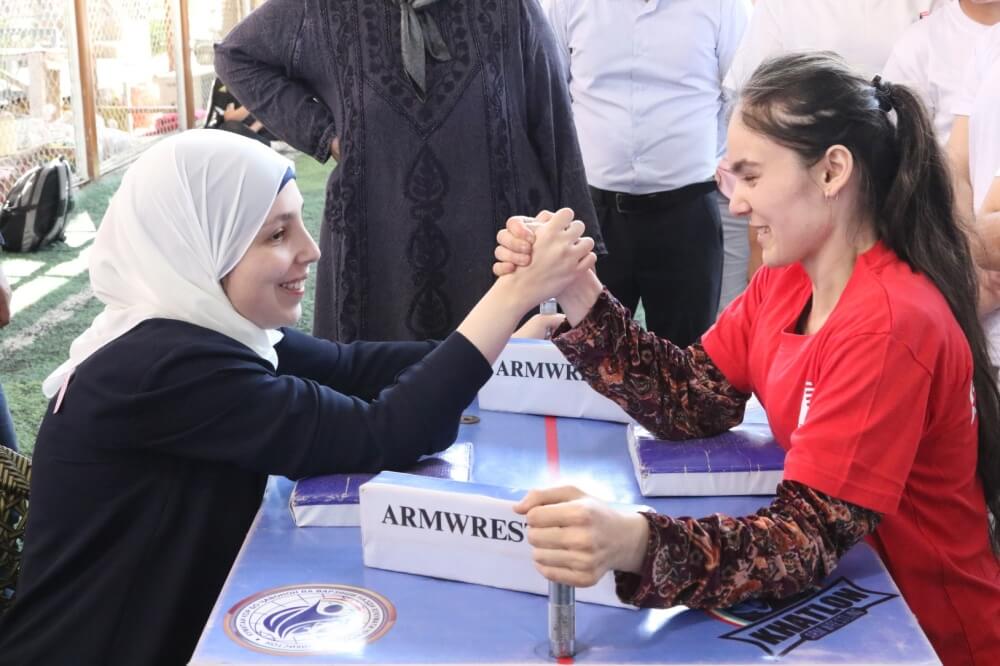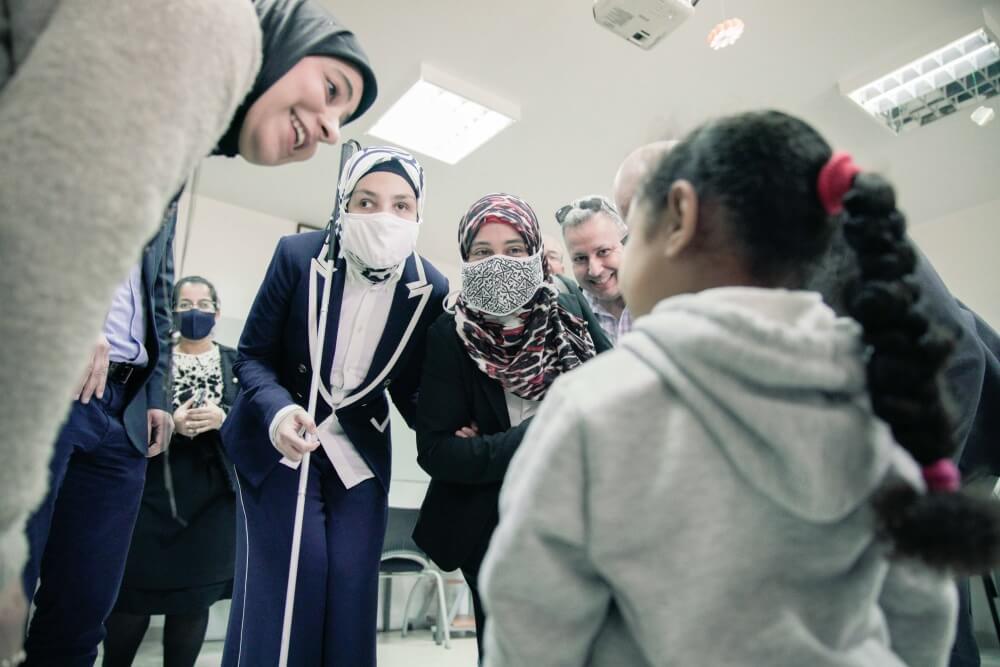The views discussed in this piece do not represent the U.S. Government.
Sara Minkara lost her sight at the age of seven due to juvenile macular degeneration — a rare genetic condition — but she has never allowed that to slow her down. Once she grew up, she made her life’s goal helping the world become more inclusive of persons with disabilities.
However, just as her advocacy was gaining steam, she had to put it on hold for treatment that would alleviate the worsening symptoms of her thalassemia, a hereditary blood disorder that Minkara had coped with since birth.
Arm-in-arm with her care team at Dana-Farber Brigham Cancer Center, Minkara was able to make it back to doing what she loves.

Coping with thalassemia
Thalassemias are a group of inherited blood disorders in which the genes that produce hemoglobin, the protein in red blood cells that carries oxygen from the lungs to all parts of the body, are broken. As a result, the red blood cells do not contain enough hemoglobin, causing anemia that can range from mild to life-threatening.
In 2015, Minkara began struggling with bone pain and fatigue as a result of her thalassemia, and she even had to have her spleen removed in an attempt to remediate her symptoms. Removing the spleen can lengthen the lifespan of red blood cells and reduce the need for blood transfusions. However, Minkara’s symptoms continued to worsen.
“There were a series of different issues to the point where my body was kind of collapsing,” Minkara continues. “At some point my hematologist said, ‘This is not sustainable: you need to meet with Dr. Antin.” That was Joseph H. Antin, MD, now–chief emeritus of Stem Cell Transplantation at Dana-Farber Brigham Cancer Center.
Minkara required a stem cell/bone marrow transplant, a procedure that would replace her stem cells so they would begin producing new and healthy red blood cells. First, she would require intensive chemotherapy to disrupt her bone marrow’s ability to produce new blood cells. Then, she would receive stem cells from a healthy, compatible donor. Finally, she would have to enter isolation to reduce her risk of infection as those new cells began to produce new blood cells and a healthy immune system.
The timing wasn’t ideal. Having just completed her graduate studies at Harvard Kennedy School, Minkara was busy. She was working part-time for the Disability Rights Fund, teaching a course at Harvard, performing research as a visiting fellow at the Carr Center for Human Rights at the Kennedy School, and running her own non-profit, Sara Minkara LLC.
On top of all this, she had just been accepted to the Green Fellowship, which would have enabled her to focus fulltime on Sara Minkara LLC. Her nonprofit is focused on educating and empowering individuals, NGOs, and other companies to create inclusive workplaces and leadership. Minkara has spoken to hundreds of thousands across the world about the importance of inclusion, diversity, and equity in the workplace with a focus on persons with disabilities and the challenges they face in a society that is often unwelcoming and inaccessible.
Even though this time was stressful, and it was difficult to step away, Minkara was able to turn the situation into a slightly positive one.
“I was working up until the day before I had to start chemo,” she says. “I needed to make sure that my non-profit work would continue beyond just me. Having that push was actually a blessing.”

Accessibility in cancer care
Minkara says that her Dana-Farber care team, including Antin, and Bonnie Dirr, NP, were supportive and mindful of her needs before, during, and after treatment.
“The whole nursing staff were so great and so accessible,” she says. “As a blind patient, accessibility from both a technical perspective and a cultural perspective is really important, and everyone made me feel very safe.”
“When you’re blind and can’t see what’s around you and if people don’t tell you what’s going on, it can be very scary,” she continues. “You don’t want people coming up and putting a needle in you without telling you. You want to be able to be fully aware and informed and seen as a person that’s independent and has their own voice.”
The admiration is mutual.
“Sara is an extraordinary human being,” says Antin. “Not only did she overcome the challenges and barriers facing her, but she was also so focused on helping others that I continually had to restrain her from putting her own health at risk by traveling during the recovery phase of the transplant.”
“I feel blessed to have the pleasure of coming to know Sara,” says Dirr. “She approaches everything she does with beauty, grace, passion, and fierce determination, and pushes herself to uphold these standards. This in turn pushes me to be the best human being I can be. The profound impact of her presence is nothing less than extraordinary.”
Her family and mosque community in Quincy also supported her through treatment. Her younger brother was even her bone marrow donor. Minkara leaned on him and the rest of her family through the long window of isolation required for transplant patients as their immune systems rebuilds from the ground up. She also received daily visits from people in her mosque community and learned the true importance of that support network.
“The more we create a sense of community around each other and a sense of understanding what vulnerability means, the better we’ll be able support one another during the toughest moments,” she says.
Returning to work on an international stage
Minkara wasted no time getting back to work and returning to her company as soon as Antin cleared her. She began traveling the world again, fueled by energy she felt after her transplant and finally being free of thalassemia.
“Since my bone marrow was now producing good blood, I understood what it meant not to feel tired and in pain,” she says.
After starting her own consultancy group, Minkara got another call: She was asked to join the United States government as a special advisor on international disability rights.
“I wish that my healthcare experience at Dana-Farber and with Dr. Antin, Bonnie, and all the nurses — how accessible and welcoming it was — I wish that is the experience for every other patient in this world,” Minkara says.
